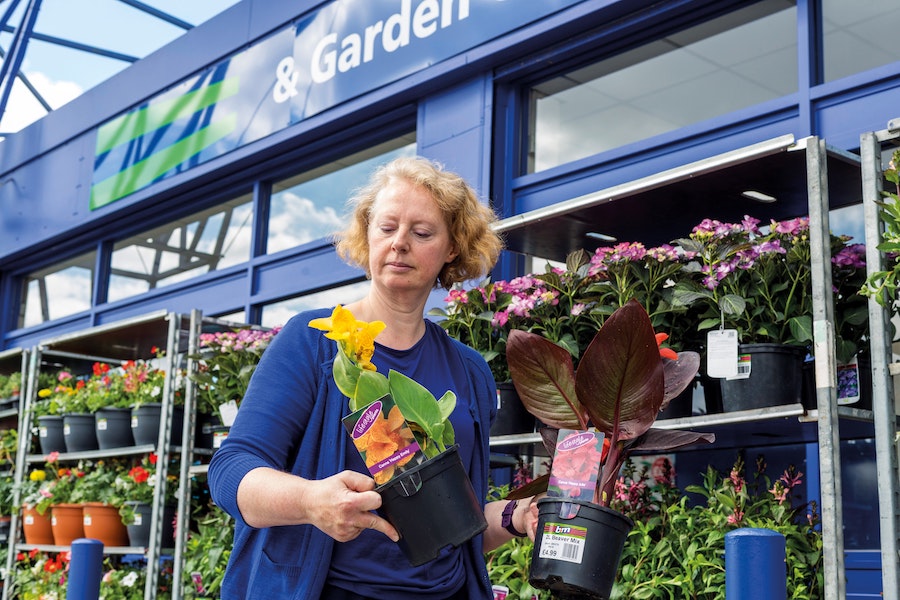Supermarkets vs DIY stores: Who comes out top for plant quality and price?
Supermarkets and DIY stores have for some time been selling a variety of plants – but how do they compare for quality and value for money?
Which? Gardening, the Consumers’ Association magazine, tested plants at 11 supermarkets and DIY stores, including Aldi, B&Q, Lidl, Tesco, Homebase and Sainsbury’s last year, to find out how they fared against each other in terms of choice, plant quality and value for money.
Researchers compared price and quality of bedding plants, bulbs, perennials and small trees, buying a selection of plants between February and June, and growing them on to see which ones offered real value for money over the summer.
For plant quality, the best stores included Waitrose, B&Q, B&M, Morrisons and Homebase, while Lidl and Aldi did better for value for money – with best bargains including Daffodil ‘tête-à-tête’ at 89p for a pot of five bulbs from Lidl, and Pansy ‘Spring’s Here Mixed’, at £2.50 for 20 plants from Aldi.
So, how did some of the main players rate?
Waitrose
Did well for plant quality – most of the plants were rated ‘excellent’ or ‘good’ but were relatively expensive. Researchers tested perennials, bedding plants and dahlias which grew on well, but choice was lacking compared with other supermarkets.
Aldi

Aldi plants did well on value for money
Great for cheap bedding and had weekly plant offers throughout the year, arriving in stores on Thursdays and Sundays. The best varieties sold out fast. Best bargain here was Pansy ‘Spring’s Here Mixed’, at £2.50 for 20 plants. However, plant quality wasn’t as good as some other supermarkets.
Tesco
Offered new plants each week and some real bargains, including a fuchsia in a 10.5cm pot for £2. Tesco came out well in value for money and also had some unexpected plants on offer, including Trachycarpus fortunei (Chusan palm) for £12. But plants weren’t always well tended, so advice is to visit as close to delivery day as possible.
B&Q
Plant sections were more like you’d find in a garden centre here, offering a wide range from bulbs to small trees, and the quality of the plants was generally very good, with competitive pricing. Multi-buy offers throughout the season also create value for money. Best bargain from B&Q was an Acer palmatum ‘Atropurpureum’ at £4 for a 10.5cm pot.
Morrisons
Morrisons had the widest choice of plants of any of the supermarkets tested and did well on all counts – choice, plant quality and value for money – with a huge range of in-season plants on offer, both on trolleys outside and shelves inside the store. Most were well-watered and cared for, and testers found everything from seeds and bedding, to acers and tomatoes. The best bargains were with slightly larger plants in 1 or 2-litre pots.
Lidl
What Lidl lacked in quality it made up for in value for money – just be aware that it specialises in time-limited offers on plants. There was a huge range, from bedding to fruit trees, and surprise tender plants such as Tibouchina urvilleana. But some in plastic sleeves were unhealthy when they were unwrapped.
Homebase
Did well on choice and plant quality – very similar to B&Q, but quality of plants varied greatly from store to store.
So, how do you bag a bargain?
With all the bedraggled, forlorn plants you so often see at the entrance to supermarkets, you might think that they will never recover. Which? suggests the following tips…
1. Look at the quality of the compost in the pot, as you might need to replace it as soon as you get the plants home.
2. Check if the roots fill the pots. Small plants may be sitting in pots which are much too large for them.

Check the compost, roots and general look of the plant
3. Wait a few weeks to make your purchases, if plants look too small early on in the season. You may find that the same plant will come back into stock having been grown in optimal conditions in a commercial greenhouse.

Choose robust plants such as geum
4. Go for tougher plants that will come back no matter how neglected they are, such as geums and Clematis viticella cultivars.
5. Check out sale plants but avoid any that show signs of disease.
The full report can be found in the April 2019 edition of Which? Gardening. Try Which? Gardening for £5 by calling 029 2267 0000.
The Press Association
Latest posts by The Press Association (see all)
- The best ways to boost your immune system as cold temperatures hit - January 5, 2025
- The Osmonds star and ‘beloved husband and father’ Wayne Osmond dies aged 73 - January 2, 2025
- What screenings are available on the NHS to detect cancer early? - January 2, 2025
- Help your grandchildren make the most of Big Schools’ Birdwatch - January 1, 2025
- Veteran radio star Johnnie Walker dies aged 79 - December 31, 2024




















